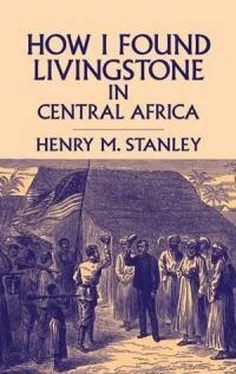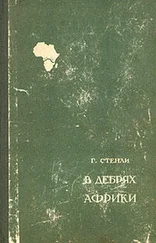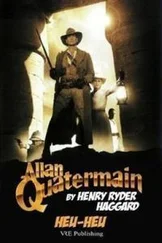Генри Стенли - How I Found Livingstone
Здесь есть возможность читать онлайн «Генри Стенли - How I Found Livingstone» весь текст электронной книги совершенно бесплатно (целиком полную версию без сокращений). В некоторых случаях можно слушать аудио, скачать через торрент в формате fb2 и присутствует краткое содержание. Год выпуска: 1872, Жанр: Биографии и Мемуары, на английском языке. Описание произведения, (предисловие) а так же отзывы посетителей доступны на портале библиотеки ЛибКат.
- Название:How I Found Livingstone
- Автор:
- Жанр:
- Год:1872
- ISBN:нет данных
- Рейтинг книги:5 / 5. Голосов: 1
-
Избранное:Добавить в избранное
- Отзывы:
-
Ваша оценка:
- 100
- 1
- 2
- 3
- 4
- 5
How I Found Livingstone: краткое содержание, описание и аннотация
Предлагаем к чтению аннотацию, описание, краткое содержание или предисловие (зависит от того, что написал сам автор книги «How I Found Livingstone»). Если вы не нашли необходимую информацию о книге — напишите в комментариях, мы постараемся отыскать её.
How I Found Livingstone — читать онлайн бесплатно полную книгу (весь текст) целиком
Ниже представлен текст книги, разбитый по страницам. Система сохранения места последней прочитанной страницы, позволяет с удобством читать онлайн бесплатно книгу «How I Found Livingstone», без необходимости каждый раз заново искать на чём Вы остановились. Поставьте закладку, и сможете в любой момент перейти на страницу, на которой закончили чтение.
Интервал:
Закладка:
Horrors upon horrors are in it. Boas above our heads, snakes and scorpions under our feet. Land-crabs, terrapins, and iguanas move about in our vicinity. Malaria is in the air we breathe; the road is infested with "hotwater" ants, which bite our legs until we dance and squirm about like madmen. Yet, somehow, we are fortunate enough to escape annihilation, and many another traveller might also. Yet here, in verity, are the ten plagues of Egypt, through which a traveller in these regions must run the gauntlet:
1. Plague of boas. | 7. Suffocation from the 2. Red ants, or "hot-water." | density of the jungle. 3 Scorpions. | 8. Stench. 4. Thorns and spear cacti. | 9. Thorns in the road. 5. Numerous impediments. | 10. Miasma. 6 Black mud knee-deep. |
May 1st. Kingaru Hera.-We heard news of a great storm having raged at Zanzibar, which has destroyed every house and every ship, — so the story runs;-and the same destruction has visited Bagamoyo and Whinde, they say. But I am by this time pretty well acquainted with the exaggerative tendency of the African. It is possible that serious loss has been sustained, from the evidences of the effects of the storm in the interior. I hear, also, that there are white men at Bagamoyo, who are about starting into the country to look after me (?). Who would look after me, I cannot imagine. I think they must have some confused idea of my Expedition; though, how they came to know that I was looking for any man I cannot conceive, because I never told a soul until I reached Unyanyembe.
May 2nd. Rosako.-I had barely arrived at the village before the three men I despatched from Mvumi, Ugogo, entered, bringing with them from the generous American Consul a few bottles of champagne, a few pots of jam, and two boxes of Boston crackers. These were most welcome after my terrible experiences in the Makata Valley. Inside one of these boxes, carefully put up by the Consul, were four numbers of the 'Herald'; one of which contained my correspondence from Unyanyembe, wherein were some curious typographical errors, especially in figures and African names. I suppose my writing was wretched, owing to my weakness. In another are several extracts from various newspapers, in which I learn that many editors regard the Expedition into Africa as a myth. Alas! it has been a terrible, earnest fact with me; nothing but hard, conscientious work, privation, sickness, and almost death. Eighteen men have paid the forfeit of their lives in the undertaking. It certainly is not a myth-the death of my two white assistants; they, poor fellows, found their fate in the inhospitable regions of the interior.
One of my letters received from Zanzibar by my messengers states that there is an expedition at Bagamoyo called the "Livingstone Search and Relief Expedition." What will the leaders of it do now? Livingstone is found and relieved already. Livingstone says he requires nothing more. It is a misfortune that they did not start earlier; then they might with propriety proceed, and be welcomed.
May 4th.--Arrived at Kingwere's Ferry, but we were unable to attract the attention of the canoe paddler. Between our camp and Bagamoyo we have an inundated plain that is at least four miles broad. The ferrying of our Expedition across this broad watery waste will occupy considerable time.
May 5th.-Kingwere, the canoe proprietor, came about 11 A.M. from his village at Gongoni, beyond the watery plain. By his movements I am fain to believe him to be a descendant of some dusky King Log, for I have never seen in all this land the attributes and peculiarities of that royal personage so faithfully illustrated as in Kingwere. He brought two canoes with him, short, cranky things, in which only twelve of us could embark at a time. It was 3 o'clock in the afternoon before we arrived at Gongoni village.
May 6th.-After impressing Kingwere with the urgent necessity of quick action on his part, with a promise of an extra five-dollar gold piece, I had the satisfaction to behold the last man reach my camp at 3.30 p.m.
An hour later, and we are en route, at a pace that I never saw equalled at any time by my caravan. Every man's feelings are intensified, for there is an animated, nay, headlong, impetuosity about their movements that indicates but too well what is going on in their minds. Surely, my own are a faithful index to their feelings; and I do not feel a whit too proud to acknowledge the great joy that possesses me. I feel proud to think that I have been successful; but, honestly, I do not feel so elated at that as at the hope that to-morrow I shall sit before a table bounteous with the good things of this life. How I will glory in the hams, and potatoes, and good bread! What a deplorable state of mind, is it not? Ah, my friend, wait till you are reduced to a skeleton by gaunt famine and coarse, loathsome food-until you have waded a Makata swamp, and marched 525 miles in thirty-five days through such weather as we have had-then you will think such pabula, food fit for gods!
Happy are we that, — after completing our mission, after the hurry and worry of the march, after the anxiety and vexation suffered from fractious tribes, after tramping for the last fifteen days through mire and Stygian marsh, — we near Beulah's peace and rest! Can we do otherwise than express our happiness by firing away gunpowder until our horns are emptied-than shout our "hurrahs" until we are hoarse-than, with the hearty, soul-inspiring "Yambos," greet every mother's son fresh from the sea? Not so, think the Wangwana soldiers; and I so sympathize with them that I permit them to act their maddest without censure.
At sunset we enter the town of Bagamoyo. "More pilgrims come to town," were the words heard in Beulah. "The white man has come to town," were the words we heard in Bagamoyo. And we shall cross the water tomorrow to Zanzibar, and shall enter the golden gate; we shall see nothing, smell nothing, taste nothing that is offensive to the stomach any more!
The kirangozi blows his horn, and gives forth blasts potential as Astolpho's, as the natives and Arabs throng around us. And that bright flag, whose stars have waved over the waters of the great lake in Central Africa, which promised relief to the harassed Livingstone when in distress at Ujiji, returns to the sea once again-torn, it is true, but not dishonoured-tattered, but not disgraced.
As we reached the middle of the town, I saw on the steps of a large white house a white man, in flannels and helmet similar to that I wore. I thought myself rather akin to white men in general, and I walked up to him. He advanced towards me, and we shook hands-did everything but embrace.
"Won't you walk in?" said he.
"Thanks."
"What will you have to drink-beer, stout, brandy? Eh, by George! I congratulate you on your splendid success," said he, impetuously.
I knew him immediately. He was an Englishman. He was Lieut. William Henn, R.N., chief of the Livingstone Search and Relief Expedition, about to be despatched by the Royal Geographical Society to find and relieve Livingstone. The former chief, as the Expedition was at first organized, was Lieut. Llewellyn S. Dawson, who, as soon as he heard from my men that I had found Livingstone, had crossed over to Zanzibar, and, after consultation with Dr. John Kirk, had resigned. He had now nothing further to do with it, the command having formally devolved on Lieut. Henn. A Mr. Charles New, also, missionary from Mombasah, had joined the expedition, but he had resigned too. So now there were left but Lieut. Henn and Mr. Oswell Livingstone, second son of the Doctor.
"Is Mr. Oswell Livingstone here?" I asked, with considerable surprise.
"Yes; he will be here directly."
"What are you going to do now?" I asked.
"I don't think it worth my while to go now. You have taken the wind out of our sails completely. If you have relieved him, I don't see the use of my going. Do you?"
Читать дальшеИнтервал:
Закладка:
Похожие книги на «How I Found Livingstone»
Представляем Вашему вниманию похожие книги на «How I Found Livingstone» списком для выбора. Мы отобрали схожую по названию и смыслу литературу в надежде предоставить читателям больше вариантов отыскать новые, интересные, ещё непрочитанные произведения.
Обсуждение, отзывы о книге «How I Found Livingstone» и просто собственные мнения читателей. Оставьте ваши комментарии, напишите, что Вы думаете о произведении, его смысле или главных героях. Укажите что конкретно понравилось, а что нет, и почему Вы так считаете.












